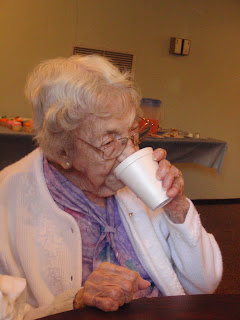 |
| 25-year-old Meg Fee lives in theWashington Heights neighborhood of Manhattan and currently works as a restaurant hostess. |
“My whole experience [at Julliard] is seen through a really distorted lens. I was surrounded by really great people, I had really great teachers, I got to perform really great roles, but it was like I was drowning the whole time, and no one was able to help me,” Fee said.
Fee wrote her way onto the road of recovery on a blog, unintentionally acquiring a following of 1,200 inspired by her story.
“I didn’t want to present a really blue person online, it made me kind of look at the world through rose colored glasses…writing helped me get to a place where I was really happy,” Fee said.
 |
| Fee's blog chronicles her life since 2008, and includes posts about the eating disorder, her family, friends, and the recent book club she started for blog followers. |
While the road to recovery has not been an easy one, her story has motivated many of her readers.
“I think your ‘failing’ is so inspiring. Most people either aren't smart enough, don't love themselves enough, or aren't brave enough to do what you are doing…you are brilliant,” one reader wrote.
Along with ‘ned’ and ‘fed’, Fee’s blog chronicles her life experiences after college. Her book club of blog followers, her family, her travels, and her daily life are all seen through the eyes of a Canon lens and the thoughts typed away on her keyboard.
“The more you’re able to identify the 10,000 other things that you are, more than just a person that doesn’t want to eat again, that’s the most helpful,” Fee said.
While Fee wants to return to acting, she doesn’t feel ready just yet. Fee chose to stay in New York after college instead of going back to Houston, Texas, her hometown.
“I felt if I moved away, I was choosing another life, and it wasn’t a life that involved acting,” she said. “I wasn’t ready to close the door on that chapter in my life, to cut off all possibility.”
 |
| Fee attended Julliard from 2004 to 2008 as a student in the drama department. |
“I got into Julliard and felt I couldn’t say no to that…which it turns out is not a good way to make a decision,” Fee said.
In college, Fee frequently played the roles of older women because Julliard performances often included more of the older, classic dramas.
Her favorite role was that of an older mother in the play “Ghosts,” because the director was extremely restrictive.
“He directed you within an inch of your life and a lot of people hate that that…but I find I’m much more creative when I’m given instructions,” Fee said.
Fee admits she may be an old-fashioned romantic. She refuses to try online dating, and writes many 'love letters:' short posts for her husband-to-be, wherever he may be. Fee hopes he will not be a follower of her blog. Many of her male followers who desired to date often assumed immediate access to a lot personal information because they had read the blog.
“I don’t want him to read my blog until he knows me,” Fee said.














